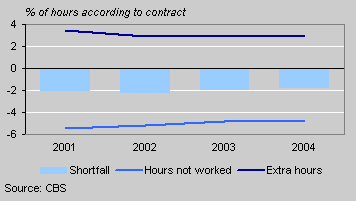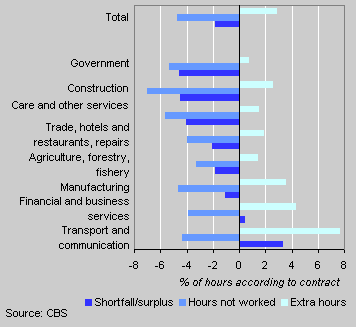Fewer hours worked than agreed

The average number of hours that employees work is smaller than the number of hours they work according to their employment contracts. The reason for this is that the number of hours not worked because of absence for various reasons is higher than the number of extra hours worked.
Extra hours worked and hours not worked

In 2004 hours not worked by employees amounted to just under 5 percent. Overtime, both paid and unpaid amounted to nearly 3 percent extra hours. This resulted in a net shortfall of nearly 2 percent of hours that should have been worked according to employee contracts. Absence through sickness accounts for most hours lost; in addition hours lost because of dentist’s and doctor’s appointments, and because of bad weather conditions are important causes. Hours not worked because of parental leave, short-time and strikes contribute only slightly to the total hours not worked.
Both overtime and hours lost decreasing
In the period 2001-2004 both the percentage of hours worked extra and the percentage of hours not worked decreased slightly. This is probably related to the economic recession and the decrease in employment in this period. When the economy performs poorly, paid overtime falls and sickness absence decreases. In addition, measures have been taken in recent years to reduce sickness-related absence.
Overtime and hours not worked by sector of industry, 2004

Net surplus in transport and communication
There are considerable differences between sectors of industry in the percentages of hours not worked and extra hours worked. Most extra hours are worked in the transport and communication sector: nearly 8 percent of the hours according to contract. Workers in road transport account for most of the paid overtime in this sector. The number of hours not worked is highest in the construction sector. Weather conditions are the main reason for this. Hours lost because of bad weather have amounted to 2 percent in the last two years. Fewest hours are lost in agriculture.
Net surplus/shortfall
The net result of extra hours worked minus hours not worked is least favourable for government employees (including education). They have the largest shortfall of hours: around 4.5 percent of contract hours are not worked in this sector. This is the result of 0.8 percent overtime and more than 5.3 percent hours not worked. Transport and communication has the largest surplus. As many employees work overtime in this sector, they work 3 percent more net than laid down in their contracts.
Erik van Hoogteijlingen and Hans Langenberg